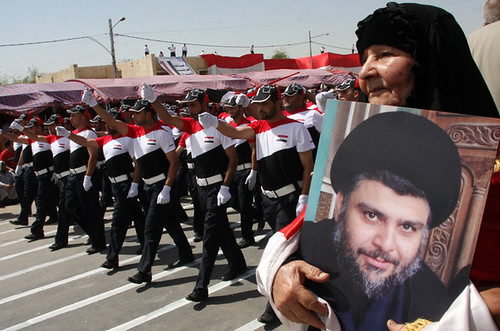
Supporters of the Iraqi leader Muqtada al-Sadr had demonstrated in Baghdad demanding the withdrawal of United States imperialist troops from the country by the end of the year. The group threatened to resume armed struggle if the imperialists remain., a photo by Pan-African News Wire File Photos on Flickr.
Sadr bloc calls for early elections in Iraq
5:44pm EST
By Suadad al-Salhy
BAGHDAD (Reuters) - The head of the political bloc of anti-American Shi'ite cleric Moqtada al-Sadr called on Monday for new elections in Iraq after the biggest crisis in a year saw Prime Minister Nuri al-Maliki move against two senior Sunni rivals.
Tensions are rising after Maliki, a Shi'ite, sought the arrest of Sunni Vice President Tareq al-Hashemi - accused of running death squads. Maliki also asked parliament to fire Sunni Deputy Prime Minister Saleh al-Mutlaq.
The head of Sadr's bloc, part of the ruling Shi'ite-led government, said parliament should be dissolved to try resolve the spat, which has raised concerns about a return to sectarian strife since U.S. troops withdrew a week ago.
Seven people were killed earlier on Monday when a suicide car bomber attacked Iraq's interior ministry in Baghdad. It followed a series of explosions on Thursday in the capital in which 72 people were killed.
"We are in a new phase and have found a lot of problems which give no stability to Iraq... so we will discuss this subject with the National Alliance because we are part of it," Bahaa al-Araji, the head of Sadr's bloc, said in a statement in which he also called for "new and early elections."
Support from Sadr's bloc helped Maliki to a second term following nine months of wrangling after an inconclusive election in March 2010. The National Alliance is the powerful bloc formed when Maliki's party linked with the Sadrists and other Shi'ite groups.
The latest turmoil threatens to scupper Iraq's fragile power-sharing deal that splits posts among the Shi'ite National Aliance, the mainly Sunni-backed Iraqiya party and a bloc representing Kurds.
Hashemi and Mutlaq are two of the most senior figures in Iraqiya, which announced a boycott of parliament ten days ago.
EARLY VOTE
Two senior Sadrist lawmakers said early elections were just one of the possible actions being considered in efforts to try resolve the crisis.
"It is one of the solutions that was presented in case the crisis continues and political blocs fail to reach a solution and Iraqiya insists on continuing to boycott parliament and cabinet sessions," said senior Sadrist lawmaker Amir al-Kinani.
Iraqiya will give an important signal about the future of the power sharing agreement on Tuesday when its members decide whether or not to attend a cabinet meeting.
The party, which is led by secularist Shi'ite former Prime Minister Iyad Allawi but is supported by many Sunnis, said in a statement on Sunday it was willing to participate in talks to resolve the crisis.
"We have received many positive signs from the Iraqiya leaders," said Mushriq Naji, a senior Sadrist lawmaker. "They said they are willing to end this crisis but asked for more time to talk to their top leaders. They asked for two more days."
Violence in Iraq has dropped since the sectarian civil war of 2006-07, when Shi'ite militia and Sunni insurgents often killed thousands of civilians a month.
Many Iraqis fear that the latest political dispute - on clear-cut sectarian lines - could reignite the slaughter, without the buffer of U.S. troops to separate the sides.
Turmoil in Iraq would have a larger impact on the region, where a crisis in Syria is taking on a more sectarian tone and Shi'ite Iran, Sunni Turkey and Sunni Arab Gulf states are looking to increase their influence.
Iraq's Sunni minority has felt marginalized since the rise of the Shi'ite majority after the 2003 U.S.-led invasion that toppled Saddam Hussein.
Sadr, whose Mehdi Army militia once fought U.S. and Iraqi troops, said in a statement on Sunday that the crisis may lead to one-party rule and hurt Maliki's reputation as a statesman.
Sadr ordered his militia to disarm when he joined mainstream politics in recent years, but splinter groups have continued attacks.
On Monday, an Iraqi official said Asaib al-Haq, the biggest Mehdi Army militant splinter group, had offered to lay down arms and form a political movement to take part in the next election.
"They are willing to lay down their weapons and join the political process after the bilateral security agreement was executed and U.S. troops completed their withdrawal," said Mohammed al-Hamed, spokesman for Maliki's National Reconciliation Advisor. The group could not be reached for comment.
(Writing by Serena Chaudhry; Editing by Peter Graff)
No comments:
Post a Comment